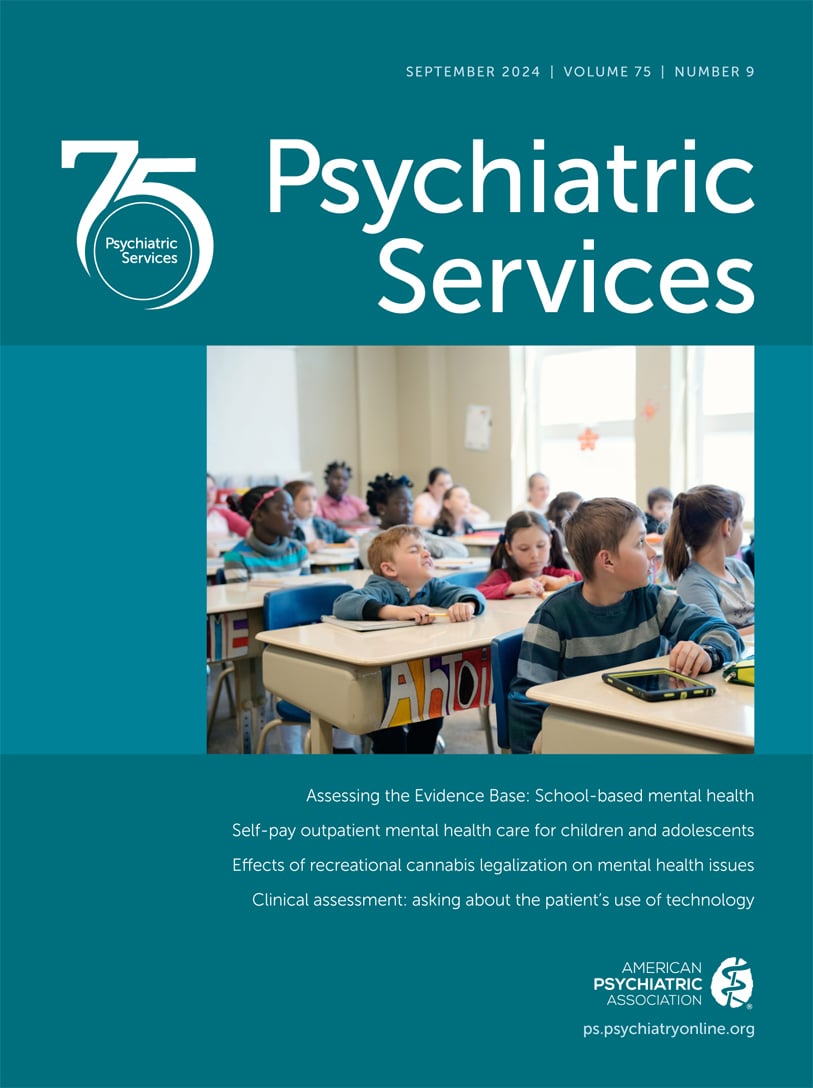Psychiatric Services
- Volume 67
- Number 9
- September 2016
This Month’s Highlights
Taking Issue
Articles
Publication date: 15 April 2016
Pages946–956Objective: The purpose of this review was to systematically evaluate the available heterogeneous research examining determinants of mental health service use among young adults. Methods: Nine electronic databases were searched to identify quantitative ...
https://doi.org/10.1176/appi.ps.201500280Publication date: 16 May 2016
Pages957–963This article presents a selective review of best practices for the psychiatric care of college student populations. It describes psychiatric advances in evidence-based practice for college students and offers a brief compendium for college health ...
https://doi.org/10.1176/appi.ps.201500465Publication date: 16 May 2016
Pages964–969Objectives: The study objective was to assess national trends in the diagnosis of attention-deficit hyperactivity disorder (ADHD) in outpatient visits by comparing adults and youths. Also examined were recent stimulant prescribing patterns for ADHD visits ...
https://doi.org/10.1176/appi.ps.201500269Publication date: 02 May 2016
Pages970–976Objectives: This study examined the implementation of age-specific services for transition-age youths in California under the Mental Health Services Act (MHSA). Methods: This study employed a sequential, exploratory mixed-methods design. Qualitative ...
https://doi.org/10.1176/appi.ps.201500084Publication date: 16 May 2016
Pages977–982Objective: Young adults with behavioral health conditions (mental or substance use disorders) often lack access to care. In 2010, the Affordable Care Act (ACA) extended eligibility for dependent coverage under private health insurance, allowing young ...
https://doi.org/10.1176/appi.ps.201500346Publication date: 15 April 2016
Pages983–989Objectives: This study sought to examine psychiatrists’ perceptions of gaps in the availability of mental health and substance use services and their ability to spend sufficient time and provide enough visits to meet patients’ clinical needs. Methods: A ...
https://doi.org/10.1176/appi.ps.201500423Publication date: 01 April 2016
Pages990–995Objective: The aim of the study was to explore the feasibility of expanding a community service for early detection of psychosis into a local London prison for men in the United Kingdom. Methods: All new receptions to a local prison for men in South London ...
https://doi.org/10.1176/appi.ps.201500355Publication date: 15 April 2016
Pages996–1003Objective: Individuals with behavioral health conditions (BHCs) smoke at high rates and have limited success with quitting, despite impressive gains in recent decades in reducing the overall prevalence of smoking in the United States. This study examined ...
https://doi.org/10.1176/appi.ps.201500337Publication date: 02 May 2016
Pages1004–1011Objective: This study examined factors associated with health care use in an ethnically diverse Canadian sample of homeless adults with mental illness, a particularly disadvantaged group. Methods: Baseline survey data were available from five sites across ...
https://doi.org/10.1176/appi.ps.201500287Publication date: 02 May 2016
Pages1012–1018Objective: “Antibenzodiazepine” campaigns have been conducted worldwide to limit the prescribing of these drugs because of concerns about inappropriate use and addiction. The causal relationship between long-term use and escalation to high doses has not ...
https://doi.org/10.1176/appi.ps.201500380Brief Reports
Publication date: 01 April 2016
Pages1023–1025Objective: The purpose of this study was to test the reliability and validity of the First-Episode Psychosis Services Fidelity Scale (FEPS-FS) and compare it with similar scales. Methods: A fidelity scale was developed from previously identified essential ...
https://doi.org/10.1176/appi.ps.201500398Publication date: 01 June 2016
Pages1026–1029Objective: The objective of the study was to describe use of services and self-care strategies by people experiencing suicidal thoughts. Methods: Constituents of the Depression and Bipolar Support Alliance (N=611) completed an anonymous online survey ...
https://doi.org/10.1176/appi.ps.201500281Publication date: 16 May 2016
Pages1030–1034Objective: To replicate and extend a study by the Agency for Healthcare Research and Quality (AHRQ) and Rutgers on antipsychotic use among youths in Medicaid, the authors analyzed Indiana Medicaid claims from 2004 to 2012, extending the earlier study by ...
https://doi.org/10.1176/appi.ps.201500061Publication date: 01 June 2016
Pages1035–1038Objective: The authors examined patients’ acceptance of the Health Technology Program (HTP), an integrative approach to relapse prevention after hospitalization of adults with schizophrenia or related disorders. The program combines use of digital tools ...
https://doi.org/10.1176/appi.ps.201500317Publication date: 15 April 2016
Pages1039–1041Objective: Computerized adaptive testing (CAT) provides improved precision and decreased test burden compared with traditional, fixed-length tests. Concerns have been raised regarding reliability of CAT-based measurements because the items administered ...
https://doi.org/10.1176/appi.ps.201500304Open Forum
Publication date: 02 May 2016
Pages1019–1022Sweeping changes in health care financing combined with the increased use of technology across health care systems are making it possible to address long-standing challenges to the behavioral health services delivery system. This Open Forum outlines ...
https://doi.org/10.1176/appi.ps.201500180State Mental Health Policy
Publication date: 16 May 2016
Pages940–942Scant evidence exists in the literature for best practices in training assertive community treatment (ACT) teams to deliver highly effective services to consumers. This column describes a blended training curriculum, which includes both face-to-face and ...
https://doi.org/10.1176/appi.ps.201600143Best Practices
Publication date: 02 May 2016
Pages943–945The dynamics of adolescence require adjustments in psychiatric treatment because of the challenges of this developmental stage in life. This column describes the Day Hospital for Adolescents (DHA) of the Institute of Mental Health in Belgrade, Serbia, ...
https://doi.org/10.1176/appi.ps.201600089Letters
News & Notes
Past Issues
View Issues Archive
Vol. 75 | No. 12

Vol. 75 | No. 11

Vol. 75 | No. 10
